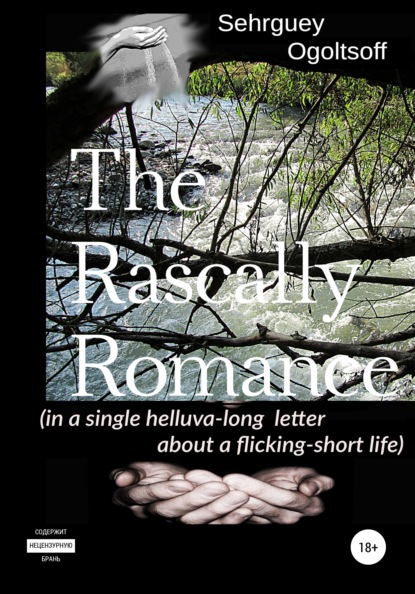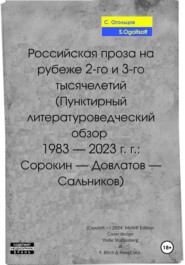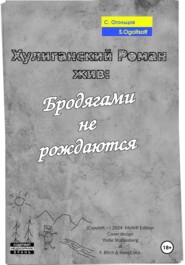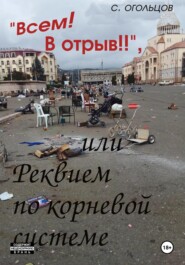По всем вопросам обращайтесь на: info@litportal.ru
(©) 2003-2025.
✖
The Rascally Romance (in a single helluva-long letter about a flicking-short life)
Настройки чтения
Размер шрифта
Высота строк
Поля
With its well-trodden snow, the Gorka served ideally for riding sleds. The start was taken from the concrete road surrounding the blocks. The deep rut left in the snow by tires of random cars confirmed that the road was still there and so did the bulbs shedding the light from their lamppost tops. One of those posts marked the start in the Sleigh Gorka. The cone of yellow light from its bulb drew a blurred circle—the meeting place for the sledding fans crowd.
Most of the sleds were a store purchase, you could see it by their aluminum runners and multi-colored cross-plank seats. Mine was made by Dad though. It was shorter and made of steel and much speedier than those store-bought things.
After a short run pushing the sled downhill with your hands on the backrest, you plonked with your tummy upon the seat and flew away to the foot of the hillock drowned in the dark of night pricked only by the lonely distant light above the gate of the Recruit Depot Barracks that bounced in time with the leaps and jerks of your fleeting sled. And the speed wind pressed tears out of your eyes.
When the sled came to a stop, you picked up the icy rope run thru two holes in the sled’s nose and stomped back uphill. The sled tamely ran after you, now and then knocking its muzzle against the heels of your felt boots. And with the approach of the roadside lamp, myriads of living sparks started to wink at you from the roadside snowdrifts varying their twinkle with each step.
Gee! Up there atop the Gorka, they already started to marshal a train of sleds, hitching them to each other and – hup-ho! – off the whole mass and wild screams and the frosty screech of sled runners went into the darkness…
At some point, probably, as thousands other boys both before me and after, I did something which should never be done, and we knew it all along that it was a no-no, yet the sled’s nose in the light of the bulb shimmered so beautifully with all those tiny frost-sparks that we couldn’t resist and licked it. Sure thing, as we knew beforehand, the tongue got stuck to the frost-gripped metal and we had to rip it off back with pain, and shame, and hope that no one noticed the folly inappropriate for so big a boy.
Then you plodded home, dragging your sled along with stiff hands and dropped it by the basement’s door in the staircase-entrance vestibule. You climbed upstairs to the second floor landing and knocked at your apartment door with your felt boots, and in the hallway your Mom pulled off your mittens with a bead of ice stuck to each filament of their wool, disclosing the white icicles of your hands.
She would run out into the yard to scoop up a basinful of snow and rub your senseless hands with it, and order to put them in the saucepan in the kitchen sink under the cold water running from the tap. And life would start to slowly come back to your hands. You’d whine from the piercing needles of unbearable pain in your fingers, and Mom would yell at you, “Serves you right! You, rascal roamer! You, bitter woe of mine!.”
And though still whimpering from the pain in your stiff fingers and in your tongue skinned by the savage frosty iron, you’d know for sure that everything will be fine because your Mom knew how to save you…
~ ~ ~
After the winter holidays, Seraphima Sergeevna brought to the classroom an issue of the newspaper The Pioneer Pravda and instead of the lesson she was reading aloud the news about Nikita Khrushchev’s promise that in 20 years we all would live in Communism built by that time in our state.
Coming back home, I shared the delightful news that in 20 years that day we were going to live in Communism when any item at the store would be given just for asking because at school they told us so. To that announcement, my parents only exchanged silent glances, yet abstained from partaking in my festive mood on account of so bright a future. I decided not to bother them any longer, but deep in my mind started arithmetic calculations to discover that being around in Communism at the age of seven-and-twenty, I wouldn’t be too badly old, still having some time to enjoy free things…
By that time all the pupils of our class had already become Octoberists, for which occasion a group of grown-up fifth-graders visited our classroom to pin Octoberist badges on our school uniforms. The badge was a small scarlet star of five tips around the yellow frame in the center out of which, as if from a medallion, peeped the angelic face of Volodya Ulyanov sporting long golden locks in his early childhood when playing with his sister he ordered her, “March out from under the sofa!.” And later he grew up, lost his hair and became Vladimir Ilyich Lenin, and they wrote a great many books about him…
At home, there appeared a filmstrip projector – a clumsy device with a set of lenses in its nose tube, as well as a box of small plastic barrels to keep tight dark scrolls of filmstrips. Among the filmstrips, there happened some old acquaintances – the one about the hero of the Civil War, Zhelezniak the Seaman, another about the little daughter of a revolutionary, who smartly dropped the typesetting sorts, brought by her father for printing underground leaflets, into a jug of milk when the police raided their house late at night. They never had brains enough to check under the milk…
Of course, it was I who loaded the filmstrips and then rotated the black scroll-wheel to move the projected frames. And I also read the inscriptions under the pictures, which did not last long though, because my sister-’n’-brother learned them by heart and retold before the whole frame would creakily creep down into the rectangular of light shed onto the wallpaper.
The challenge to my seniority from Natasha did not hurt so bitterly as Sasha’s disobedience. Just so recently as we two pranced, panting, into the kitchen to still our thirst with water from the tap, he readily conceded the white tin mug, adorned with the revolutionary battleship Aurora’s imprint on its side, to me as to the elder, bigger, brother. And emptying half of it, I generously handed the mug back for him to finish off the water, after all, that was the way for strength transmitting. How come that I became so strong? Because, without silly prissiness, I drank a couple of gulps from the bottle of water started by Sasha Nevelsky, the strongest boy in our class.
My younger brother listened with trust to my naive claptrap and dutifully grabbed the outstretched mug… Like me, he was over-credulous and once at midday meal, when Dad took out from his soup plate a cartilage without meat and announced: who’d gnaw it up was to get a prize—one kilo of gingerbread, Sasha volunteered and, after protracted munching, managed to swallow the cartilage but never got the promised sweetmeat, probably Dad forgot his promise…
A parcel arrived from the post-office, or rather Mom dropped in there to pick it on her way home after work, that box of faded plywood secured by a string glued to its sides with brown blobs of stamped sealing wax, with two addresses in block blue letters on its top: to our numbered mailbox from the city of Konotop.
The parcel was set on a stool in the kitchen and all of the family gathered around. The lid with the addresses, nailed firmly and aplenty, had to be removed by application of a big kitchen knife used as a lever, and revealed a sizable lump of lard, and a red hot-water bottle of hooch gurgling in between its rubber sides. The rest of the space within the box was filled to the brims with black sunflower seeds.
When slightly scorched in a frying pan, the seeds became simply delicious. We crushed them with our teeth, piled hulls away into a saucer placed in the center of the kitchen table, and enjoyed those small but so tasty, sharp-nosed, hearts.
And then Mom said if not eating them just so, one after another, but you amass, say, half a glass of husked seeds then add a sprinkle of sugar, that would be a treat indeed. Each of her 3 children was handed a tea glass to collect the hearts into. Instead of a saucer, Mom equipped us with 1 deep plate for all, and deftly rolled a huge cornet of a newspaper which she filled with the fried seeds.
We left the adults to eat unsweetened seeds in the kitchen and went over to the children’s room, where we lay upon the pieces of the carpet runner frizzled in the fire of long-ago past. As it should be expected, the level of peeled hearts in Natasha’s glass rose quicker than in ours, although she jabbered more than cracked. But when even my brother began to overtake me, I felt hurt.
The slowness of my progress resulted from considering a cartoon on the side of the newspaper cornet, a pot-bellied colonialist blasted off away from the continent of Africa, the black imprint of a boot kick in the seat of his white shorts. So I dropped the distracting contemplation of his flight and tried to husk faster, exercising a stricter self-control too, so as not to accidentally chew some of the harvested hearts, however, all my struggle for catching up with the younger proved useless.
The door opened and Mom entered the room with a half-glass of sugar and sprinkled a teaspoon of it over our personal achievements, but I was already sick and tired of them those foolish seeds, no matter sugared or not, and in my following life I stayed indifferent forever to the delights of sunflower seed orgies.
(…but still and all, consumption of seeds is much more than a trifling pastime combined with a sapid side-effect, no!. it's grown into a real art in itself.
To start with the purely Slavonic lavish way of eating them in the “piggy” style when the hollowed, or simply chewed together with the hearts, black hulls are not vivaciously spat out over the nearby environs, nope, they are set instead, by sluggish pushes of the tongue, on the move from out the corner of the mouth and keep sliding in a mutual, saliva-moisturized, mass down the chin to finally plop onto the eater’s chest. Excessive satiety, yes.
Or for a contrast, again a Slavonic but this time graceful “filigree” style when seeds are tossed by the snacker, one after another, into their mouth from a distance no less than twenty-five centimeters (20”).
And so on, down to the chaste Transcaucasia manner, when a seed for crushing is fed into the (yes, inescapably) mouth from a fixed position between the thumb tip and the joint of the index finger, so as to screen the intake of the seed, and then the processed husk is not spat out randomly but carefully returned into the burka-like contrivance of finger-screen to be scattered somewhere, or collected into something.
On the whole, the last of the presented methods leaves an impression of the eater biting their own thumb on the sly. But at who?
" Did you bite your thumb at me, Sir?!."
Oh, yes, sunflower seeds are miles aloft of dull popcorn. However, that’s more than enough about them.
Back to the green, cut-up, carpet runner…)
It was on those runner pieces where my brother felled my authority of the eldest by 1 dire blow… That day coming home after a PE lesson, I thoughtlessly stated that performing one hundred squats at one go was beyond human power. Sasha silently sniffled for a while and then said that he could do it.
Natasha and I were keeping the count, and after the fifteenth squat, I yelled that it was all wrong and unfair because he didn’t fully rise, but Sasha went on with squats as if I never said a word, and Natasha continued to keep the count. I shut up and soon after joined my sister in counting, though after “eighty-one!” he could no longer rise even above his bent knees. I felt pity for my brother over-strained by those incomplete squats. He staggered, tears welled up in his eyes, but the count was brought to a hundred and he barely hobbled to the big sofa. My authority collapsed like the colonialism in Africa; good news that before the fall I hadn’t promised any gingerbread…
~ ~ ~
Where did the filmstrip projector come from? Most likely, our parents bought it from a store. And in their room there appeared Radiola—combination of the radio and record player. 2 in 1, as they call it now.
The lid on top and both sidewalls of Radiola shed gentle gleam of brown varnish. The rear side had no gloss because it was hard cardboard with multiple rows of tiny portholes facing the wall. However, pulling Radiola a little forward, you could peep thru them and catch a patchy view of the murky interior landscape: the white of aluminum panel-houses, the dim glow in the pearly black turrets of vacuum-lamps of different height and thickness, and from one of those holes, a brown cable ran out ending by the plug for a mains socket.
Over the Radiola’s face was pulled a special sound-friendly cloth thru which you easily could trace the big oval speaker beneath the round sleeping eye whose glass flashed up with green when you clicked on the Two-in-One on. The long low plate of glass inserted along the front side bottom bridged the control knobs: the power and volume adjustment (2 in 1) above the range selection switch on the right, and only one knob on the left—for fine-tuning to the wavelength. The glass plate was glossy black except for four horizontal transparent stripes, from end to end, marked with irregular hair-width vertical snicks and the names of capital cities, like, Moscow, Bucharest, Warsaw. While twirling the knob of fine adjustment, you could follow, thru those transparent stripes in the glass, the progress of the thin red slider crawling from city to city along the inner side of the plate.
The radio was not very interesting though, it hissed and cracked and swished along with the slider movements, sometimes there would float up an announcer’s voice reading the news in some unknown Bucharestian language, a little farther along the stripe it would be replaced with a Russian voice repeating the news from the wall radio. Yet, lifting the lid on top of Radiola, you kinda opened a tiny theater with the round stage of red velvet having a shining pin in the center to slip on it the hole in a record disk when loading it on the pad. Next to it, the slightly crooked poker of the white plastic adapter sat on its stand.
With the turntable switched on and spinning the disk, the adapter had to be carefully picked up from its stand, brought over the whirling disk's surface and lowered in between the wide-set initial grooves running round and round and after a couple of hissing turns there would start a song about Chico-Chico from Costa Rica, or about O, Mae Caro, or about a war soldier marching in a field along the steep river bank.
The cabinet under Radiola held a stack of paper envelopes with gleaming black disks made at the record factory in the Aprelev City whose name was printed on the round labels about the center hole, beneath the song’s title, and the name of the singer, and the instruction that the rotation speed was 78 rpm.
Next to the adapter’s perch, there was the gearshift lever with notches for 33, 45, and 78 rpm. Disks of 33 rpm were much narrower and spun slower than 78 rpm disks, but they—so small—had two songs on each side!
Natasha shared it with us that when you launched a 33 rpm disk at the speed of 45 rpm then even the Soviet Army Choir named after Aleksandrov began to sing with Lilliputian puppet voices…
~ ~ ~
Dad never was too keen on reading. He read nothing but The Radio magazine full of schematic blueprints of capacitor-resistor-diodes, which every month appeared in the mailbox on our apartment door. And, since Dad was a Party man, they also put there the daily Pravda and the monthly The Blocknote of Agitator filled with the hopelessly dense text running for one or two endless paragraphs per page and not a single picture in the whole issue except for Lenin's profile on the cover.
Because of his Party membership, twice a week Dad attended the Party Studies Evening School, if it was his “dog watch” week. He went there after work to write down the lessons in a thick copybook of leatherette covers because after two years of studying Dad had to pass a very difficult exam.
From one of the evening classes, Dad brought home a couple of Party textbooks, which they distributed among the Party members who attended the Party Studies Evening School. However, he never opened even those books, which, as it turned out, was his mistake. The bitter fruit of his neglect came out 2 years later when in one of those Party books he found his stash—a part of salary concealed from the wife for expenses at one’s own discretion. Full of heartfelt regret and belated self-reproach lamented Dad over the find, because the stash was in the money used before the monetary reform which turned it into funny papers…
Among the many names used for the Object where we lived, there also was that of “Zona”, the vestige from those times when zeks were building the Object. (Zeks live and toil in “Zonas” as know all and everyone.) At the end of the second academic year at the Party Studies Evening School, Dad and other learners were taken for their examination “out of Zona” – to the nearest district center. Dad was noticeably worried and kept repeating that he knew not a damn thing, although his thick copybook was already written down to the almost very end. And who cared, dammit, argued Dad, for another year at that Party Studies Evening School!
From Out-of-Zona he returned in a very merry mood because at the examination he had got a feeble “3” and now all his evenings would be free. Mom asked how come he passed the exam without knowing a damn thing. Then Dad opened his copybook for Party Studies and showed his good-luck charm—a pencil drawing of an ass with long ears and brush-like tail, which he made during the exam on the last page and, beneath the animal, inscribed his magic formula: “pull-me-thru!”
I did not know if Dad’s story was really worth believing because he laughed so much while telling it. So I decided that I’d better not say anyone about the ass who pulled my Dad from the Party Studies Evening School…











